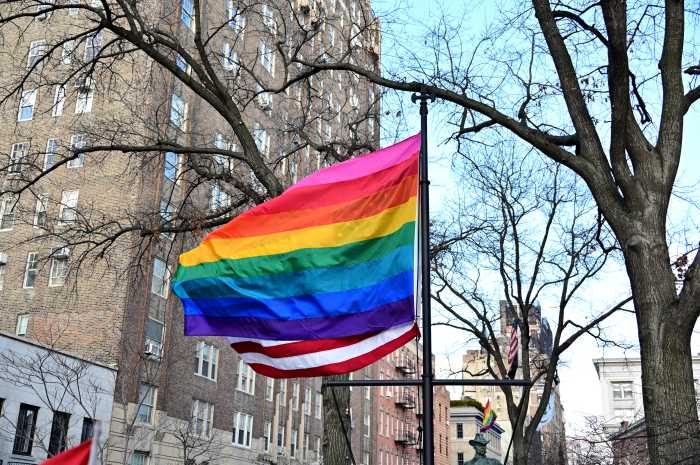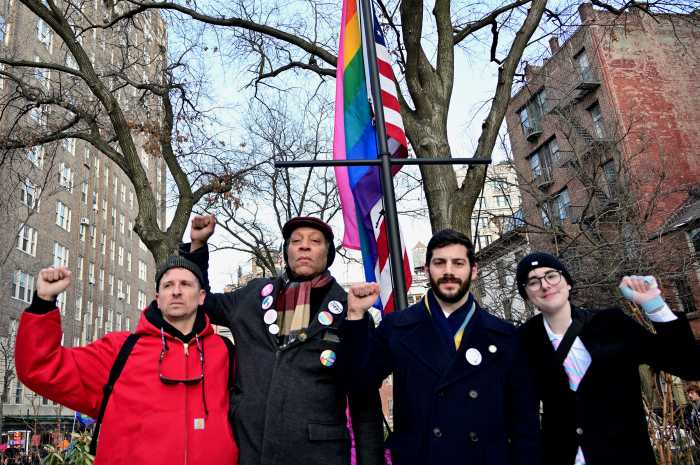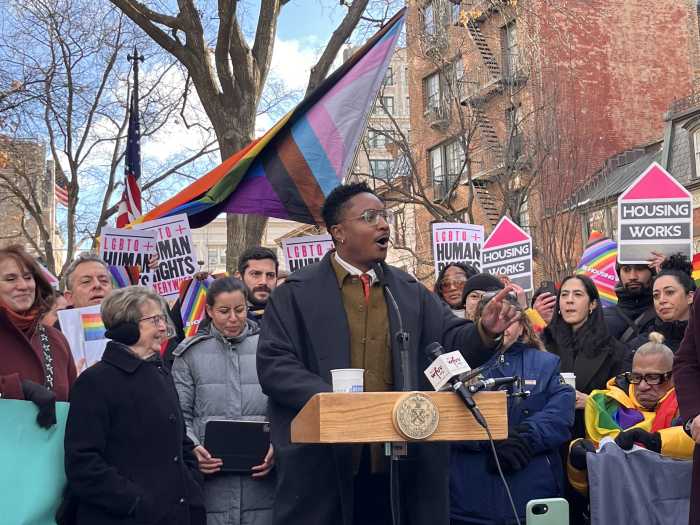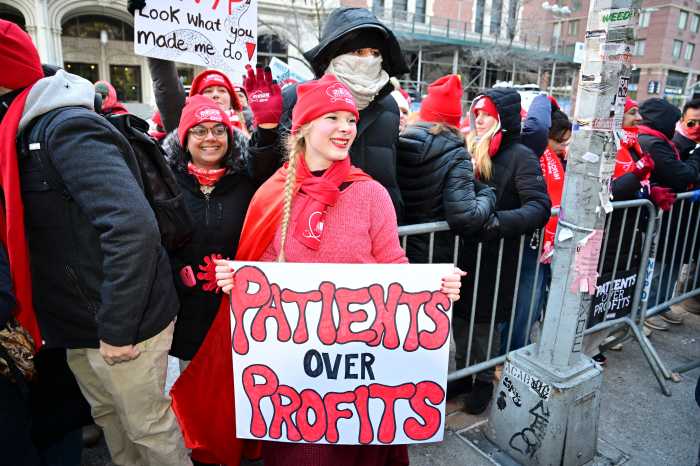Leslie Crocker Snyder, potential Morgentau foe, faces critics
At an April 28 appearance before the Stonewall Democratic Club, a lesbian, gay, bisexual, and transgender (LGBT) political group, Snyder faced tough questioning about financial support she was receiving from a politically connected former New York City police officer with a history of inflammatory comments about gays and about her own record as a judge.
In the weeks since the Stonewall visit, Snyder has severed her ties with the financial supporter, Bo Dietl, who retired from the NYPD in 1985 and now runs a firm providing investigation and security services worldwide. But, she remains unapologetic about her tenure on the State Supreme Court, in which she earned a reputation for being tough on defendants perhaps best captured in the title of her 2002 memoir about her career as a prosecutor and a judge, “25 Years to Life.”
And Stonewall members in attendance that evening are split over how well Snyder did in her effort to introduce herself politically to the LGBT community.
In looking at a race against Morgenthau—Snyder’s spokesperson underscored several times that she is only in the exploratory phase of her effort—the former judge, who once worked for both Morgenthau and his predecessor Frank Hogan, is taking on an iconic figure in New York legal circles. First elected in 1974, Morgenthau previously served for nine years as Manhattan’s U.S. attorney, appointed to that post by Pres. John F. Kennedy.
Yet time is not on Morgenthau’ side. At the end of this month he turns 85 and could be vulnerable in a reelection bid for another four-year term from a younger, aggressive challenger. Snyder was the first woman in New York County to try felony cases and established the nation’s first Sex Crimes Prosecution Bureau. As one of the authors of the state’s Rape Shield Law, she could mount an effective campaign that appeals to women and others concerned about sexually based crimes, a group that could well include LGBT voters.
The first challenge Snyder faced during her remarks to Stonewall centered on the support she enjoyed from Dietl, who was one of the hosts of a late March Rainbow Room $1,000 a head fundraiser that a Snyder spokesperson said was cancelled due to a scheduling conflict. Alan Roskoff, a longtime gay activist, asked Snyder about anti-gay comments that Dietl made during a series of appearances on the Don Imus Show in recent years. According to transcripts of those programs, Dietl referred to Democratic Party Chair Terry McAuliffe as a “pantie-wearin’ faggot” and a “fudge-packer liberal,” and dismissed former Pres. Bill Clinton as “a common thief,” and his wife, Sen. Hillary Rodham Clinton, as a “lesbo.”
According to Roskoff, when he read some of these comments to Snyder, referring to Dietl as chair of her fundraiser, “she sort of freaked out,” and denied he was her fundraising chair, pointing out that former U.S. Attorney Mary Jo White held that position in her exploratory committee. Roskoff said she repeated several times, “I know nothing about it,” but refused to say she would disassociate herself from Dietl if the transcripts were verified.
Snyder declined to speak to Gay City News directly about her evening at Stonewall, but a spokesperson, Jackie Rovine, insisted that Roskoff mischaracterized the exchange. According to Rovine, Snyder was blindsided by the quotes from Dietl and was unwilling to respond definitively before learning the facts. Several weeks after the Stonewall meeting, the New York Post’s Page Six carried news of a Snyder statement distancing herself from Dietl for making comments that “demeaned gay men.”
In a conversation subsequent to the Post story, Rovine said Dietl “is not involved in the campaign in any way,” but would not absolutely rule out Snyder accepting money from him. In a followed up telephone call several days later, however, Rovine said Snyder would not take such financial assistance.
For his part, Dietl, whom Gov. George Pataki appointed in 1995 as chair of the New York State Security Guard Advisory Council, dismissed his comments on the Imus program as the result of “being on an entertainment show… and try[ing] to say interesting things.” Though he noted that he does endorse gay political goals such as same-sex marriage, Dietl said, “I am sorry if I offended anybody.” He also said that despite Snyder’s public criticism of him, he was prepared to continue assisting her campaign. Told that she would no longer accept his financial support, Dietl said, “As far as I am concerned if they don’t want me to be involved in the campaign, I don’t want my involvement to derail her campaign. But I have a right to raise money for her.”
Snyder also caught flak at the Stonewall meeting from Christopher Lynn, who once served former Mayor Rudy Giuliani as transportation commissioner. Lynn, who described his quibble with Snyder by saying, “She will tell you she’s tough on criminals, but in fact she is unfair and mean,” challenged the former judge about a 1997 case in which she ordered the detention of an East Harlem man for 24 days based on a physical resemblance to a wanted perp, despite the fact that a fingerprint check had cleared him. Lynn, an attorney with significant criminal defense experience, suggested that Snyder comes down particularly hard on suspects from communities of color, and that “she signs every warrant from the police.”
According to Lynn, in reacting to both him and Roskoff, Snyder was “defensive, evasive—she dug her heels in.” He said she refused to comment on the 1997 case and moments after the exchange pointed at him and referred to his “mean-spirited attack.”
Rovine reiterated that Snyder would not comment on a seven-year-old case, except to “rest on her record as a fair and impartial judge.” Asked about the exchange with Lynn, she said only that Snyder realized as he began to speak that she was acquainted with him though she did not at first recognize him.
Tom Smith, Stonewall’s president, commenting on Snyder’s appearance before the club, said, “My sense is that she dodged [Roskoff and Lynn] very gracefully and very well.” He added that as a candidate, Snyder should expect to discuss “the way she conducted herself on the bench” and who is raising money for her.
“She didn’t answer them,” Smith said of the questions posed by Roskoff and Lynn. “She pushed them off.”
But Marty Algaze, a past president of Stonewall, came away with a different impression from the exchanges.
“Considering how Lynn and Roskoff attacked her, she held her own,” Algaze recalled. “I think she is a credible candidate, and we listen to credible candidates. They were both unfair to her. I believe their behavior was inappropriate.”



































